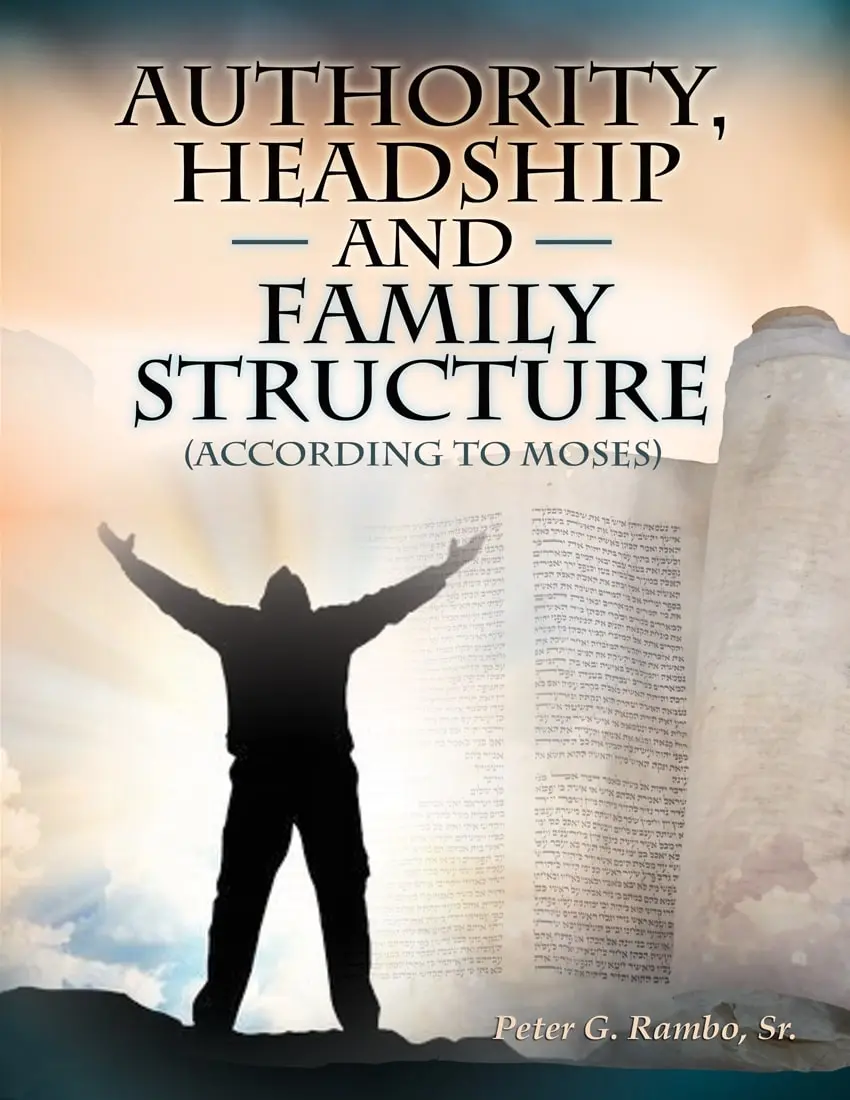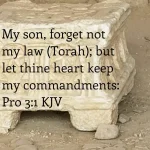Last week in an email discussion with a friend over what the responsibilities of the Gentile are to the Torah, he said, “I never said a Gentile couldn’t go beyond the minimum standard set in the Acts 15 halachic ruling, I just don’t think it is an obligation and that it is disobedience to God if we don’t.”
 Dozens of times I have addressed from various angles the fact that Yahweh has one standard for righteousness and more than a few times we have specifically discussed parts of Acts 15. Where I wanted to challenge my friend was in the Gentile obligation to Torah and whether it is disobedience to God. I countered,
Dozens of times I have addressed from various angles the fact that Yahweh has one standard for righteousness and more than a few times we have specifically discussed parts of Acts 15. Where I wanted to challenge my friend was in the Gentile obligation to Torah and whether it is disobedience to God. I countered,
Okay… here’s a question to ponder:In this email and in your last post as well as your reply to me you seem to say that it is okay for Gentiles to follow Torah, but it is not mandatory. Your advice seems to be, ‘Don’t worry about it, just wait for the Messiah to arrive and straighten it out.’
I know I am over simplifying, but that seems the general thrust of your thought. so…
Isaiah 66:18-24 seems to be about the Messianic age. Would you agree?
If so, then vss. 15-17 ought to scare the cr@p out of ALL flesh (vs. 16) and someone should be teaching that swine is unclean. Is the blood of those judged on the Jews’ hands, or is it on yours and mine? Or, both?
Thoughts?
My assertion is that in Isaiah 66:16-23 we are clearly warned that “the Lord will execute judgment by fire, And by His sword on all flesh,” and one of His targets are “Those who … eat swine’s flesh, detestable things and mice…”
Clearly, this passage points to the judgment by fire spoken of as occurring at the Day of the Lord. Pursuing the passage a little further reveals a sequence of events at the beginning of the Messianic age that leads to “23 “And it shall be from new moon to new moon and from sabbath to sabbath, all [g]mankind will come to bow down before Me,” says the Lord” which may occur during the Messianic Kingdom or in the New Heaven and New Earth. In either case, it describes future events. The point being that ‘all flesh’ in both the beginning and end of this passage that appears to be a continuous flow of events point to ALL people being required to keep dietary laws and the Feasts of Yahweh. Not just Jews and not an option.
My friend responded to my question with,
I’m uncomfortable taking one little slice of scripture and making it a complete theology about Gentiles and the Torah, but it’s quite possible and likely that vv 15-17 specifically address the nation of Israel and the following verses address Jews and Gentiles in the Messianic age. Isaiah especially wasn’t written in an incredibly linear fashion, so we can’t read it as we would a modern narrative. Even portions of the Torah seem to jump back and forth in time. I’d have to go over Isaiah in more detail *and* I’d have to consider that portion of Isaiah in the larger context of the whole Bible.
While I completely agree that Isaiah does seem to skip around at places, this passage looks very linear to me. I also completely agree that we must look at the larger context of Isaiah and the Bible as a whole, which is exactly why I see over and over the fact that God has one unchanging standard for all men. When non-Jews come to the God of Abraham, Isaac and Jacob, they come to His standard and learn to walk as grafted in members of the commonwealth of Israel… but, I digress. (Note: I maintain that rabbinic interpretation of Torah may be the distinctives/yoke that are Jewish. I am bound by Torah, not rabbinic halacha.)
So, according to my friend, ‘all flesh’ in vs. 16 ‘likely’ refers only to ‘nation Israel’ while ‘all flesh’ a few verses later refers to ‘all flesh?’ (Yes, my face is totally contorted at this point…) In an effort to understand the phrase ‘all flesh’ a little better, I started to dig…
Isa 66:16 כי באשׁ יהוה נשׁפט ובחרבו את־כל־בשׂר ורבו חללי יהוה׃
Isa 66:23 והיה מדי־חדשׁ בחדשׁו ומדי שׁבת בשׁבתו יבוא כל־בשׂר להשׁתחות לפני אמר יהוה׃
Isa 66:24 ויצאו וראו בפגרי האנשׁים הפשׁעים בי כי תולעתם לא תמות ואשׁם לא תכבה והיו דראון לכל־בשׂר׃
The phrase translated as ‘all flesh’ is כל־בשׂר, transliterated as kol basar.
The first place I find this phrase is, interestingly, in a judgment passage!! Genesis 6:12,13,17 and 19 all use it with verse 19 including not just people, but all animals as well. Literally, ALL flesh!! Again it is used in Genesis 7:21; 9:11 & 17 in forms that easily and unambiguously encompass ALL humans with context sometimes including animals as well.
Rounding out the Torah uses that e-sword helped me find, Leviticus 17:14 and Deuteronomy 5:26 again point ONLY to ALL flesh or ALL mankind. I have not found a single use that points to a subgroup of people. Additional references to verify: Job 34:15; Psalm 65:2; 145:21; Isaiah 40:5-6; 49:26; Jeremiah 32:27; Ezekiel 20:48; 21:5; and Zechariah 2:13. [For your ‘word search’ pleasure, all previous linked references lead to a side-by-side English and Hebrew version that allow you to find כָּל־בָּשָׂ֑ר in each. The last three are unlinked because the Hebrew numbering is different than the English… Find all three in the Leviticus reference. Have fun!!]
The point is, if ‘all flesh’ ( כל־בשׂר ) means ALL FLESH, and I find zero evidence that it can mean otherwise, then we had better NOT be telling Gentiles that parts of Torah observance are ‘optional’ because Isaiah 66:16 clearly indicates they will be judged for eating the unclean. If we do tell them it is ‘optional,’ then their blood is on our hands. Rather, in the most loving manner we can, we need to contend for the truth of the Word: God has one standard by which He will judge ‘kol basar’ and we best be leading people toward it, not away from it!




















































































































And if Acts 15 is all that matters then what about the big two-loving Yah and our neighbor? Those aren’t included ..,. (Levi threw that one out at a pastor who tried to Acts 15 him out of obedience). Thought it was good 🙂
LikeLike
You post made me wonder about the Holy Spirit being poured out on “all flesh”, do you think Peter was right and that happened? Do you think that those saved by Messiah are saved indeed?
It sounds like you are at least suggesting those justified will be destroyed if they continue to eat pork.
LikeLike
Steven,
Shalom and welcome.
Let me take your three questions separately.
Peter was right in the sense that all flesh could receive the Spirit. In fact, it was through Peter’s obedience to the Father in visiting Cornelius’ household, recorded in Acts 10, that he/we first witness the Holy Spirit fall on Gentiles.
I believe salvation by grace through faith is the first step. But, it was the first step for Israel when they left Egypt. They went under the blood, through the water and then received instructions on what righteous living looked like. The continued disobedience of those already bought with blood led to judgment. It is no different today. Salvation doesn’t mean we get to sit on our hind parts! Obedience is a must. James (actually Jacob, see the Greek) said, ‘I’ll show you my faith BY my works.’ Great article I read today on this very issue: http://thebarkingfox.wordpress.com/2014/06/20/how-to-build-on-the-right-foundation-what-the-bible-says-about-good-works/comment-page-1/#comment-183
Disobedience will bring judgment. Not my deal, but Yahweh’s. I do think that sin in ignorance has a bit more leniency, however, most all believers I know have a copy of the Scriptures and are accountable for every word therein. The thrust of this post is less about wrestling with the clean and unclean, – I have done that numerous times on this blog – and more about refuting the false idea that non-Jewish believers in Messiah Yeshua have a different set of standards to live by.
But, since we are on the topic, here is an old post that will challenge you: https://natsab.com/2013/11/03/he-judges-by-smell/
Shalom!
LikeLike
My Grandmother ate pork and did not keep the Shabbat. She loved Jesus and was filled with the Holy Spirit. You say her judgement was not laid on Yeshua? She will be judged without Christ?
LikeLike
So did my father. Their fate is in the hands of Yahweh. I trust He judges the heart, however, you and I both are learning more about the fulness of His Word in these days. Sinning willfully will bring judgment. Not my words, but the Words of Scripture.
Your argument is an appeal to emotion, not fact.
LikeLike
Yes, an emotional arguement, that in itself does not make it wrong, Yeshua, Peter, Paul, John, all made emotional arguements.
My grandmother took Yeshua at his word, that it is what comes out of the mouth that makes one unclean. She believed that the Apostles did not put the entire law on her. My Father and Mother kept shabbat and ate Kosher, but understood that in Messiah one is clean.
So, I see it from both sides and understand neither was sinning willfully.
LikeLike
Okay. I understand that. As a ‘recovering pastor,’ nobody taught me to eat clean. Like your grandmother probably was, I was taught that some laws were overturned. Later, the Father began to teach me otherwise. It is at that point that I believe I became fully accountable for that which He was/is showing me.
So the question from Isaiah 66, clearly a future event, do we ignore it or do we teach (in love, per OMJ blog conversation) that which we are learning? I can’t change the past or reach back to friends and family that have passed on, but I can make a difference with those I come in contact with today.
By not opening my mouth as the Spirit gives opportunity, am I failing them and setting myself up for a stern reprimand? Probably. I am my brother’s keeper.
LikeLike
As far as I can tell you want to do what is right. You will probably love your brother just as much and treat him well, no matter if he keeps the whole law of not. You know what grace means and can minister it. You probably don’t think your better than anyone else and won’t fall into that trap. I think you will do just fine. His mercy never fails.
“Let the word of Christ dwell in you richly in all wisdom; teaching and admonishing one another in psalms and hymns and spiritual songs, singing with grace in your hearts to the Lord.”
LikeLike
Pete,
Great post.
Several times now, in discussions regarding Torah relevance for the Gentile believer I too have heard a similar phrase, as was written by your friend: “Well, in the whole of Scripture……”
So far, every time this has been spoken it comes as a result of the antinomian Christian having to come to terms with a passage that, when examined in context, does not fit their paradigm. Often the “whole of Scripture” comment is more of a retreat from the conversation than it is an actual apologetic.
I usually call them on it. My response is along these lines: “Well, why don’t we look at ALL the troublesome passages and really see what each of them is saying. Would you not agree that the WHOLE is made up of the PARTS, and if we find that all the parts are saying the same thing, like we’ve found in this passage we have just examined, would that not mean the WHOLE may not be saying what we think?”
Unfortunately, every single time, the response has been, “I just don’t have time for that.”
Where I’ve dropped the ball is how I’ve always kowtowed to their “lack of time” excuse.
No more.
From now I’m going to say, “You know what Chester? If you took the time, you’d be a Messianic.”
LikeLiked by 1 person
Eating pork is now the unforgivable sin?
LikeLike
Shalom and welcome, FST.
Remember, Isaiah 66 is future prophecy and not my word…. I won’t say it is unforgivable, but I will say that it is called ‘an abomination’ and is nowhere in Scripture ever allowed or encouraged. Traditions of men twisting Scriptures have allowed ham sammiched at the church buffet tables, but Isaiah 66 says it is a ‘no-go.’
I suggest taking it up with Isaiah…
LikeLike
The eating of swine’s flesh is in two quite different contexts. The Torah rule is so that we can live in good health. The other context is that here were those who deliberately ate it as a sign of rebellion. A good look at the food laws show that, within our present level of knowledge, they were designed to keep us from foods that could harm us in a number of different ways. If we eat the forbidden foods, there is physical danger involved. We can ignore the science, but not the health consequences.
LikeLike
I would say very simply, it would be much better to error on the side of obedience, than disobedience.
Most of this boils down to simply relationship to the covenant. Either gentiles in Messiah are now part, or they are not. Most Christians, while claiming to be part, want none of the responsibilities that come with the covenant, they want just the blessings and honor, some Messianics who argue that gentiles are not part of the covenant through Messiah, at least receive the bread crumbs, which is short for blessings, also argue none of the responsibilities. Technically, gentiles should all be happy, do whatever they want, minus a few negative commands of what not to do… who knew serving God and following Him could be so easy, reminds me of the days before I knew God. Remember, you don’t have to serve God to be responsible to the laws given Noah, looks like nothing has changed. 😛
Both of those views regard Paul’s words as purely metaphor, such as engrafting or citizenship, with no literal implications, which makes both views extremely irrational.
With those two views above, Acts 15:24
“Since we have heard that some of our number to whom we gave no instruction have disturbed you with their words, unsettling your souls,”
The views mentioned above, define the disturbance, as gentiles possibly having to obey God’s Law and that’s what was so unsettling… “God forbid that if we decide to trust in Him, we might have to obey Him… Apostles to the rescue, don’t worry, you don’t have to obey God’s big bad Law, just don’t get into trouble and don’t worry about the rest, have a nice life, there’s the door.” 😀
Conclusion, I don’t have a problem with people who decide NOT to obey God or feel like they are not responsible, that is their choice, just don’t go around telling others to NOT obey God… that is a grave mistake.
LikeLike
I find your study of all “flesh” quite interesting, Pete. Especially since the root (bet, shin, resh — Strong’s H1319) means preach the good news or gospel! (In places like Is. 61:1, 52:7; Nah. 1:15)
I’d never considered the fact that this Hebrew word has so many connections to both the gospel and judgment. That’s something to meditate on. (: thanks for sharing!
LikeLike
Pingback: One Law, Water, Light and Bread | natsab
Pingback: …the faith once delivered… | natsab
Pingback: A few more ‘Memra’ verses in this portion…. | natsab